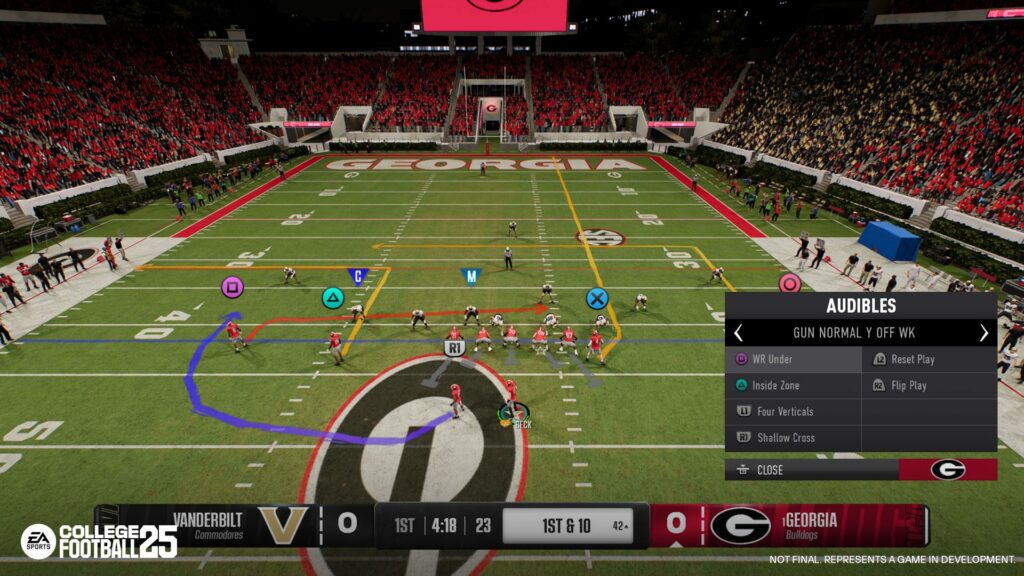In the world of college football, the read option play has emerged as a game changer, providing teams with a strategic advantage on the field. The "best read option playbook NCAA 25" stands out as a premier resource for coaches and players alike, seeking to master this dynamic offensive strategy. Understanding the intricacies of the read option not only enhances a team's performance but can also significantly impact the outcome of the game. As we delve deeper into this playbook, we will explore its significance, components, and the best practices for implementing it effectively.
The evolution of the read option stems from the need for adaptability in an ever-changing football landscape. With the increasing speed and athleticism of players, traditional offensive styles have given way to more innovative approaches that capitalize on mismatches and defensive weaknesses. The "best read option playbook NCAA 25" provides a comprehensive guide to harnessing these strategies, ensuring teams can remain competitive in today's fast-paced game.
As we embark on this journey through the intricacies of the read option, we will address common questions, break down essential components, and offer insights into making this play a cornerstone of your offensive strategy. Whether you are a seasoned coach or a young athlete, this playbook is designed to elevate your understanding and execution of the read option to new heights.
What is the Read Option and Why is it Important?
The read option is an offensive strategy that relies on the quarterback making quick decisions based on the defensive alignment. This play allows the quarterback to either hand off the ball to a running back or keep it for themselves, depending on the actions of the defensive players. The importance of the read option lies in its ability to create confusion among defenders, forcing them to make split-second decisions that can lead to big gains for the offense.
How Does the Read Option Work?
At its core, the read option works by reading the defensive end's movements. The quarterback will "read" the end's commitment to either rush or maintain their position. If the defensive end crashes down to tackle the running back, the quarterback can keep the ball and run; if the end stays wide, the quarterback hands the ball off. This dual threat keeps defenses guessing and opens up various offensive opportunities.
What Are the Key Components of the Best Read Option Playbook NCAA 25?
The "best read option playbook NCAA 25" incorporates several crucial components to ensure effective execution:
- Quarterback Decision-Making: Quick and accurate decisions are vital for success.
- Player Roles: Understanding the responsibilities of each position is essential.
- Blocking Schemes: Effective blocking is crucial for providing lanes and time.
- Timing: Proper timing between the quarterback and running back enhances play effectiveness.
What Are the Benefits of the Best Read Option Playbook NCAA 25?
Utilizing the "best read option playbook NCAA 25" offers numerous benefits for teams looking to enhance their offensive capabilities:
- Enhanced Versatility: The read option can be adapted to various formations and player skill sets.
- Increased Offensive Production: Teams can exploit defensive weaknesses for big plays.
- Improved Player Development: Athletes learn to make quick decisions under pressure.
- Strategic Advantage: The element of surprise keeps defenses on their toes.
How Can Coaches Implement the Best Read Option Playbook NCAA 25?
Coaches looking to implement the "best read option playbook NCAA 25" should consider the following steps:
- Assess Player Skills: Evaluate the abilities of the quarterback and running backs.
- Develop a Practice Plan: Create drills that focus on decision-making and timing.
- Emphasize Communication: Ensure players understand their roles and responsibilities.
- Review Game Film: Analyze successful executions of the read option in past games.
What Challenges Might Teams Face When Using the Read Option?
While the read option can be highly effective, teams may encounter several challenges:
- Defensive Adjustments: Opponents may adapt their strategies to counter the read option.
- Injury Risks: The play can expose key players to higher injury risks.
- Consistency: Teams may struggle with executing the play consistently under pressure.
How to Overcome Challenges When Executing the Read Option?
To navigate the challenges associated with the read option, teams can adopt the following strategies:
- Regular Practice: Frequent drills will help improve consistency and execution.
- Incorporate Variation: Use different formations and plays to keep defenses guessing.
- Focus on Player Safety: Prioritize player safety to mitigate injury risks.
Where to Find Resources for the Best Read Option Playbook NCAA 25?
Coaches and players seeking to deepen their understanding of the "best read option playbook NCAA 25" can explore various resources:
- Online Coaching Platforms: Websites and forums dedicated to coaching strategies.
- Football Clinics: Attend clinics to learn from experienced coaches.
- Books and Publications: Numerous books focus on offensive strategies and the read option.
Final Thoughts on the Best Read Option Playbook NCAA 25
The "best read option playbook NCAA 25" offers a comprehensive guide for coaches and players eager to master this dynamic offensive strategy. By understanding the intricacies, benefits, and challenges of the read option, teams can significantly enhance their performance on the field. With dedication, practice, and the right resources, the read option can become a cornerstone of your team's offensive playbook, setting the stage for success in the competitive world of college football.
Also Read
The Enigmatic Stellan Skarsgård: Delving Into His Height And MoreExploring The World Of Vegamovies Download.com: Your Gateway To Movies
Nicolas Charrier Now: The Latest Updates On His Journey
Is Angelina Jolie Really Gone? The Truth Behind The Rumors
Unveiling The World Of All Moviesflix: Your Ultimate Guide
Article Recommendations
- La Freeway Protest
- Oleksandr Zinchenko
- Thay Ksada
- Kristy Mcnichol
- Josh Allen Old Tweets
- Tiffany Link Earrings
- 1230857 Tyler Perry Net Worth Age Height House Wife Son
- 1534693 Piece Female Characters Deserve Attention
- 1470855 Zack Lugos Biography Age Height Net Worth Girlfriend Brother




